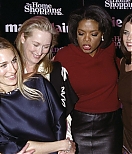I can’t count how many times since Christmas I have been informed of the imminent arrival of Failure to Launch, by movie trailers and TV spots as well as by eye-catching full-page newspaper and magazine ads that feature a breezy Sarah Jessica Parker propping up a loungey Matthew McConaughey. But I can report that the massive buildup for the star-driven romantic comedy with the title that sounds alternately dirty (launch, heh-heh) and prophetic (failure, ooh-ooh) has had a déjà vu effect. When, early in the exposition, the domestically delayed hero, Tripp (McConaughey), beds a woman whose crime it is to seek commitment and the two are interrupted by the appearance of Tripp’s father (Terry Bradshaw), I knew exactly when the Anonymous Blonde would squeal, ”You live with your parents?!” I knew when Tripp would boast that ”it’s gonna take a stick of dynamite” to blast him out of the nest (a comfy, well-decorated nest at that). And I knew that Paula (Parker), the woman hired by Tripp’s parents to lure their son into the benefits of independent living, would toss off many charming gestures of SarahJessicaParkerdom as she first works the guy, then falls for him.
Failure to Launch arrives pre-told by design. But even those coming in cold will know what’s going to happen one step ahead, because the movie has been constructed from a dull calculus based on commodities exchange (Star X + Star Y = Project Z) rather than a freewheeling script based on wit. The work is a computation, if you like, of If You Likes.
If, for example, you like McConaughey’s affect of sexy, sleepy-eyed drawl — is he toasted, or just a sun-kissed Texan? — then you are meant to like Tripp, even though screenwriters Tom J. Astle and sitcom-savvy Matt Ember abandon all hope of squaring the childish, spoiled-by-Mom slacker that Tripp appears to be pre-Paula with the far more competent, complicated, and sensitive thirtysomething adult he proves himself to be later on. This character is a bundle of What-If-We-Made-Hims who dribbles away his leisure with similarly unattached goofball pals, yet also takes seriously his responsibilities to a jaunty African-American boy he calls his nephew. And little black kids don’t appear for nothing in a white creampuff comedy like this.
If, on the other hand, you like the energy, wisecracks, fashion sense, giggles, hair fiddling, and little yips of joy with which SJP has come to define stylish urban pizzazz since Sex and the City, you’re meant to like Paula, an illegible character wholly dependent on Parker’s chic gal-pal persona. Paula’s niche business, marketed to affluent parents who wish their grown sons would fly the coop, involves stimulating separation by simulating a relationship worth leaving home for. (To be sure, the job is more geisha than ho, since sex doesn’t come with the deal.) But who she is when she’s not on the job is a cipher; we only know that Paula shares a pad with Kit, a cute-loopy weirdo who, in the tradition of eccentric romantic-comedy roommates in the person of irresistible comedienne Zooey Deschanel, sashays away with the picture every time director Tom Dey (Shanghai Noon) gives her a chance. If you like oddball sidekick subplots, you’re bound to like this diversion. (There’s a whole other romantic comedy waiting to make a break for it in Kit’s brief bull’s-eye encounter with a gun salesman played by The Daily Show’s Rob Corddry.)
By the way, if you like Kathy Bates movies, you’ll probably be frustrated with this one, since as Tripp’s mother, the invaluable character actress is made to whipsaw between playing sappy domestic slave to her son’s laundry and salty, overly sexual wife. And so, pasted into the story without logic to guide her, she does whatever the heck she pleases. The two prize headliners, meanwhile, gleam side by side, well matched in celebrity and toiling at lightness, pretending their characters could ever share a lifestyle. (McConaughey’s unshaven Tripp looks forever poised to play in the dirt, while Parker’s Paula isn’t truly happy unless striding in heels.)
There is, no doubt, a great screwball comedy to be made about adult children who won’t leave home, and the mothers and fathers who collude in the arrangement — and not just for reasons of economics. Alternately, how about a real generational conflict? Failure to Launch fails to go anywhere near the subject, either in jest or in earnest, shortchanging Tripp’s mom and pop as weaklings afraid to even bring up the subject with their overgrown boy. They are, however, so comically desperate to usher the big lug out the door that they hire a babe to deprogram him from the cult of Catering to Sonny Boy. Mission aborted.









 And Just Like That... (2021-)
And Just Like That... (2021-)

